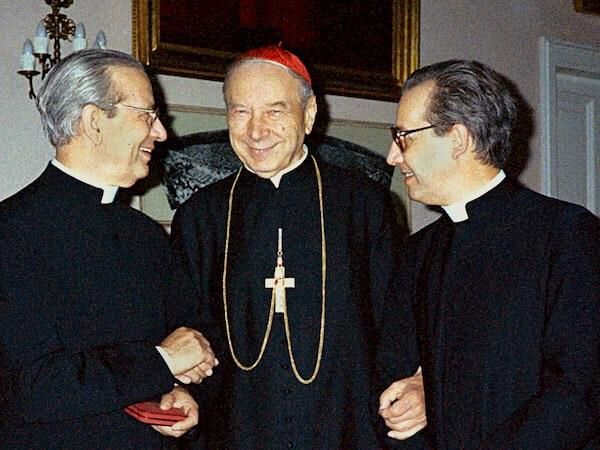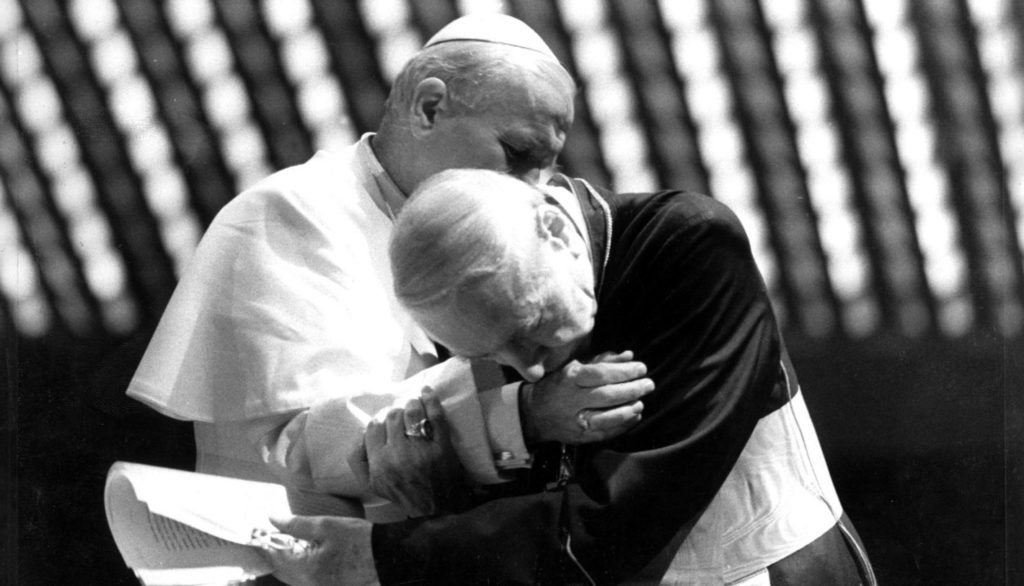(The first part of the article can be read by clicking here. here).
During the Warsaw uprising Mother Elizabeth decided to organize a field hospital within her compound. There also took refuge the priest Wyszyński continuously persecuted by the Gestapo. Stefan Wyszyński remained in Laski for two years serving as chaplain of the Sisters and priest of the AK. It was then that he met and treated Mother Elizabeth Rose and would later recall, "I would look at Mother and wonder: where does this woman get such strength and audacity to do this work facing continuous danger with her cooperation to the Uprising? It was not only the hospital, but there was also a supply and liaison center, a continuous coming and going of people. Mother thought that it was necessary to be filled with strength, for that is what the world needed at that time. She made me discover then the figure of a totally new woman, dedicated before to prayer and to the care of the blind and now, in a continuous mortal danger, she was still doing all the acts of piety but actively helping everyone. She was for us in Laski a Mother, a source of peace, serenity and promptness in service".
Mother Elizabeth Rose always, but especially in those moments, encouraged us to unite ourselves to the Cross of Christ: "At the feet of the Crucified One we cannot be inactive. Jesus Christ does not only want us to meditate on His Passion, to have compassion before His image, but to help Him save souls. Jesus wants us to use His redeeming blood to cleanse our sins and the sins of those around us, the sins of our enemies and those of the whole world. We must allow ourselves to be soaked by this Divinity. We must let ourselves be soaked by this Blood, and offer it to God for our salvation and that of the whole world".
Peace and joy at the Cross
Mother Elizabeth's motto is on the Congregation's coat of arms: Pax et gaudium in cruce. For the new Blessed, those words were rooted in trust in God and in uniting herself ever more intensely to the passion of Christ. "Suffering is inevitable. One cannot attain holiness without suffering. The man who wants to live with God needs to carry his cross, the cross that God sends him. That is why to remain close to the cross of Jesus is our way and our vocation. And I am referring to the cross that comes from the hands of God: the loss of health, of freedom. It is a hard cross, but it is good, it is a saving cross that we need to embrace".
We have in these two new Blesseds, so closely linked to the city of Warsaw, similar characters. Stefan Wyszyński always began his homilies with the greeting "Dear children of God" and his figure full of strength and dignity, especially in the face of the communist system imposed in Poland after the Second World War in Yalta, stands out with one trait: paternity. He was a Father. Mother Elizabeth Rose, also full of fortitude in the face of the Nazis and defender of the dignity of the handicapped is shown for many with a continuous reference: she was for all a mother full of fortitude, the Mother.
Cardinal Stefan Wyszynski officiated at the 1961 Mass of suffrage on the occasion of the death of Mother Elizabeth. In his homily he said among other things the following words: ¨Mirabilis Deus in sanctis suis! - God is admirable in his saints. The life of Mother Elizabeth, for many of us had only this title: Mother, speaks to us of the wonders that God does in his saints. There is always in the life of every person the hidden mystery of God. He himself is the Deus absconditus. He acts silently in the depths of the soul. He is never inactive, he is continually at work. He forms, chooses and helps people. He sends them out and causes them to be surrounded by others to serve. God chooses the instruments to cooperate. No man of God is alone, for God himself causes many to be found beside him, like bees around the queen mother of a panel¨.
Wyszyński, a man of the Polish people, Czacka, a woman of the aristocracy. Both were intellectuals, Christians of deep faith and constant prayer, full of admirable fortitude for the defense of the rights of God and of the person. I conclude with a few words of the new Blessed speaking of the Christian layman who acts in the world: "It is not a matter of being a man dominated by feverish activity, tired and mercilessly tiring others, absorbed by continuous occupation. The modern man of Christian action must have in himself more than the peace and measure of a diplomat, he must have the assurance that comes from conscience, that he helps God to save the world to the same extent that he allows God to act in his own life.
Stefan Wyszyński was ordained alone because he was unable to do so on the scheduled day of ordination, whether because of a relapse of his tuberculosis disease or because he was a few days short of his 23rd birthday, is not known for sure. The minimum canonical age was 24, but the bishop could grant a dispensation of one year, no more. Stefan was therefore ordained on his 23rd birthday, August 3, 1924. However, with all his companions, many of them future martyrs of the world war and some of them beatified, he made the obligatory spiritual exercises before ordination. He wrote down ten resolutions in his notes. He always kept this sheet in his breviary and every day he examined himself on these ten maxims or resolutions:
1. Speak little - live quietly - silence.
2. Do a lot, but without haste, with peace.
3. Work systematically.
4. Avoid dreams - don't think about the future, it is in God's hands.
5. Do not waste time, for it does not belong to you; life has a purpose and so does every instant.
6. In all things discover a good intention.
7. Pray frequently when you are at work - sine me nihil potestis facere (without me you can do nothing).
8. Respect every person, for you are worse than every person: God resists the proud.
9. Omni custodia custodi custodi cor tuum quia ex ipso vita procedit (Guard your heart with all care, for from it comes life).
10. Misericordias Dei in aeternum cantabo (I will sing the mercies of the Lord forever).
His devotion to the Virgin
An interesting anecdote about Cardinal Wyszyński, is the following:
There is a photo in which Cardinal Wyszyński is seen smiling and next to him the two future bishop prelates of Opus Dei, Blessed Álvaro del Portillo and Javier Echevarría. It was in September 1979. They traveled by car and were accompanied by the priest Joaquín Alonso and Javier Cotelo as driver. The latter recounts his memories in a family recorded interview. Here is the transcription:
"That is the photo of Cardinal Wyszyński with don Álvaro and don Javier. -Do you remember anything about that meeting? - Yes, of many things. That meeting took place the day before we left on September 7. They wanted to see the Cardinal simply to tell him that we had passed by and that the President General of Opus Dei wanted to greet him. We arrived at the bishop's palace and were met by the secretary who spoke Spanish. He told us: the cardinal is about to leave by car, he is about to leave because he has a meeting with bishops in another diocese and of course, he cannot receive them and if he does receive them, it will only take a minute.

And indeed he came out and put us in the hall of the photo. Behind us there was another picture, if I remember correctly, of Częstochowa in which you see a seat, an empty chair in the middle and a lot of people, a lot of people in front of that throne. It was his throne, the seat of the Cardinal, but it was empty because he was in prison. While we were looking at these and other photos, the Cardinal soon arrived. He received us a little dryly, saying: "What are these Italian priests coming to Warsaw doing here? I am very grateful that they come dressed in cassock, because usually the priests who come from Italy come dressed in any way". He liked the fact that they were in cassocks, but he liked Don Alvaro's answer much more: "I don't want to take a minute away from you. We have come to pray to Our Lady of Częstochowa to pray for Poland and to pray above all for Pope John Paul II, and to bring Opus Dei to Our Lady's feet, renewing the Work's consecration to her Most Sweet Heart.
Then the Cardinal was moved when he heard about the prayer and Our Lady and placed his hands on the shoulders of Don Alvaro and Don Javier at the same time. And he was transformed, he totally changed his appearance. Before, he was a bit dry, as if tired of receiving tourist priests. And when he heard about prayer, about Our Lady, he got excited and told them that he had enjoyed hearing about Our Lady and that they had come to pray, that he was happy to meet people from Opus Dei and its president general and those accompanying him, and that he apologized for not being able to be with them any longer because he was about to take the car and go to another province, to another city where he had a meeting.
He gave each of us a rosary and then said goodbye with a hug and a kiss to the priests. He only gave me a hug. Then don Joaquín said to him: "And could we take a picture of him? -Yes. Get in right away. And as you can see, he put himself between Don Álvaro and Don Javier. I took two pictures of him because Don Alvaro said to me: "Take another picture just in case the first one didn't come out well. We left there very happy and rejoicing as if we had really been with a saint because he reminded us of our Father by his smile and his gaze. When we were with Cardinal Wyszyński we had the impression that it was like with our Father: you could really feel that we were with a saint".





 Stefano Wyszyński and Mother Elizabeth Rose Czacka, the eyes of faith.
Stefano Wyszyński and Mother Elizabeth Rose Czacka, the eyes of faith.





